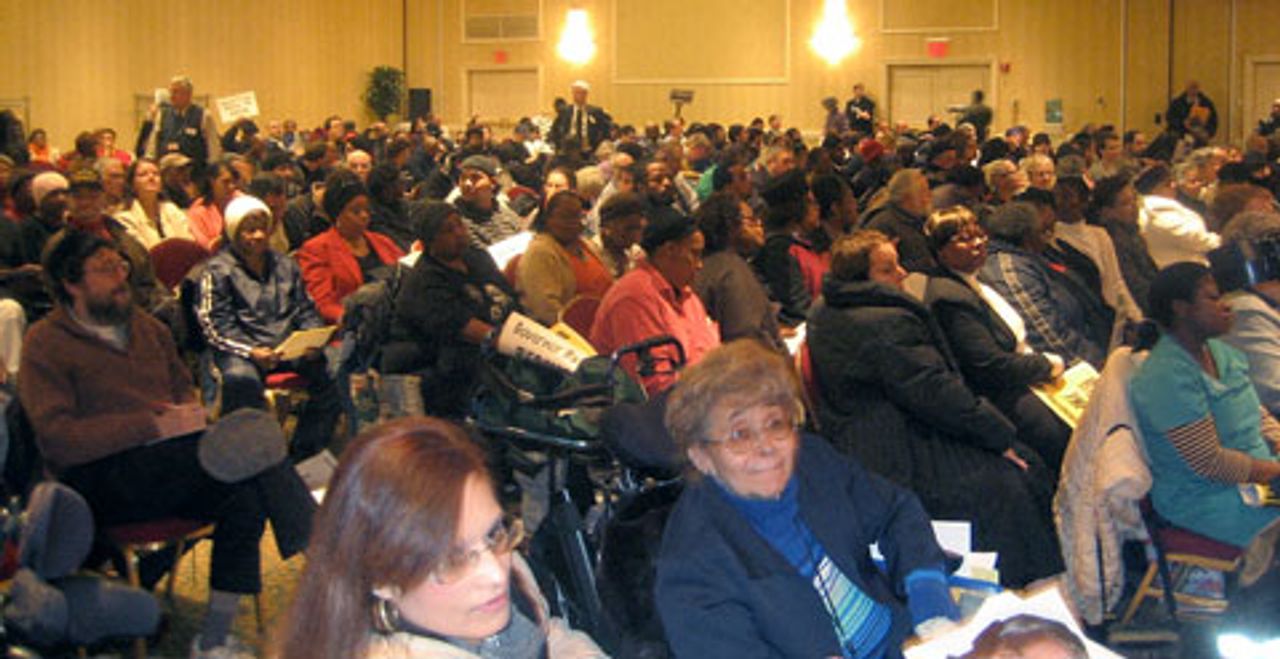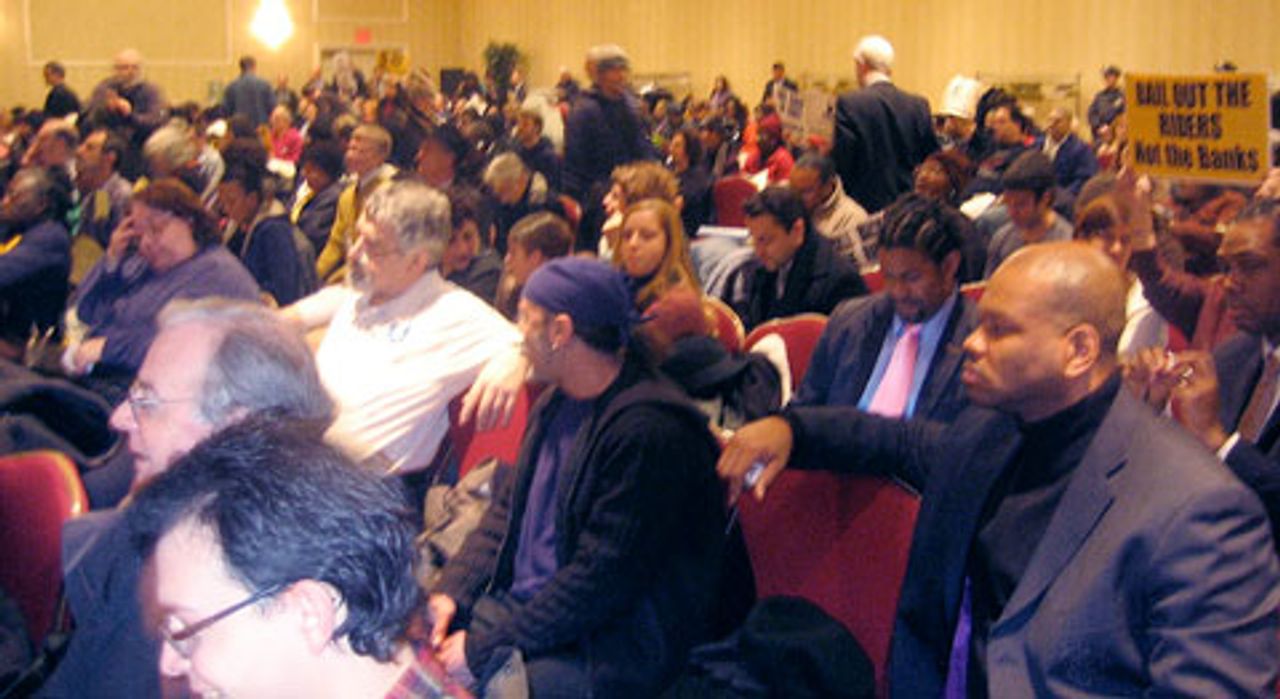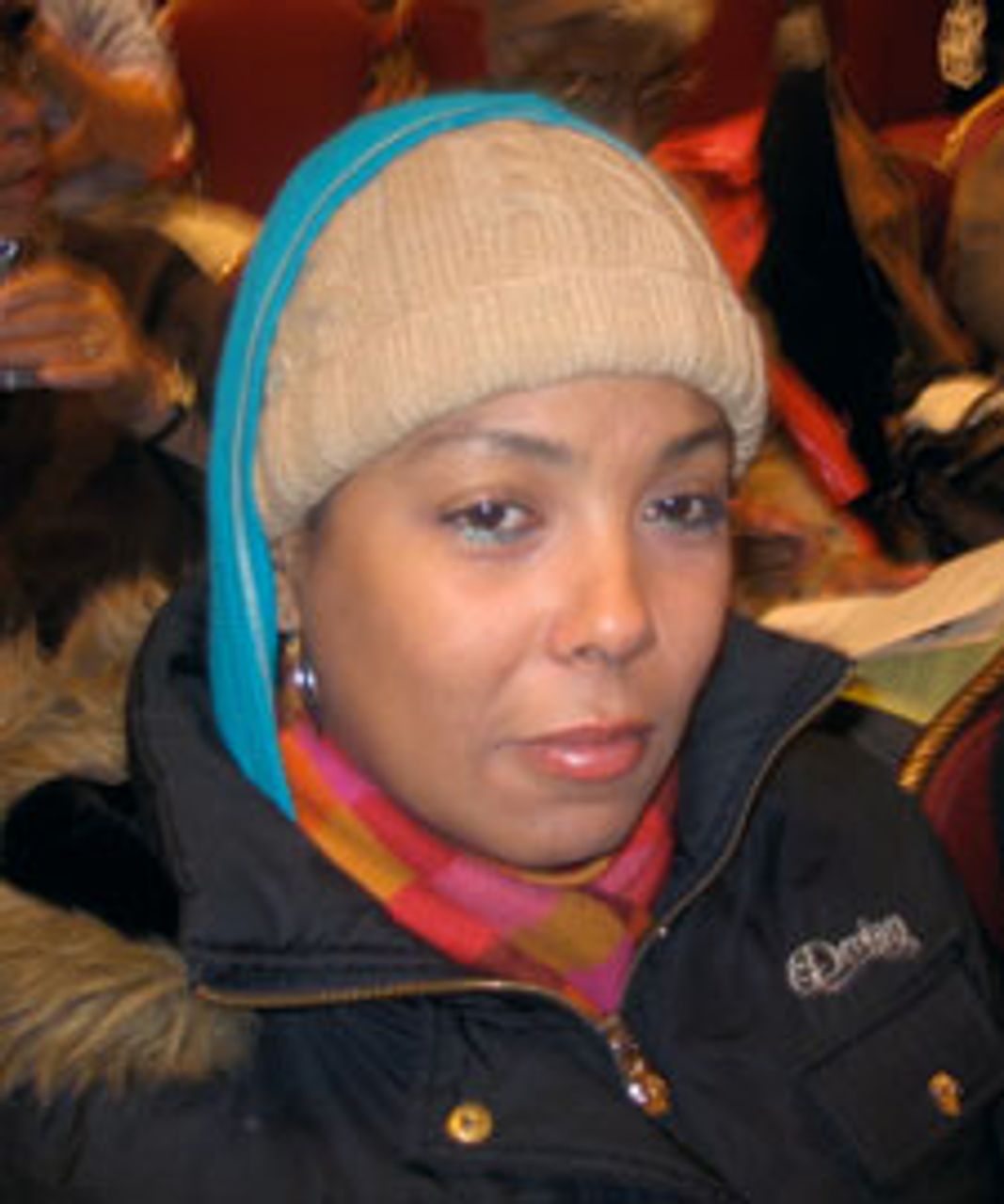 The audience at the January 28 transit hearing in Brooklyn
The audience at the January 28 transit hearing in BrooklynPlans unveiled by New York‘s Metropolitan Transit Authority (MTA) to impose massive fare hikes and service cuts on subway, commuter rails and bus service next month have provoked outrage among the 7 million people who depend upon the system for transportation.
In an effort to close a $1.2 billion budget deficit, the MTA Board has voted to increase by 23 percent tolls over bridges and fares for buses, subways, and commuter trains and will reduce bus and subway service, in some cases eliminating entire lines.
Under the new plan, the cost of a single-ride Metrocard (the pass used for subways and most buses) -- currently $2.00 -- will increase to $2.50 or even $3.00. The cost of an unlimited 30-day card will increase from $81 to $105, and the cost of a weekly card could rise to as much as $32 from $25.
While the price of an individual ride on a monthly or weekly card is significantly less than the cost of a single-ride card, a one-time outlay of $25 weekly or $81 monthly is already difficult for millions of ordinary New Yorkers. With the leap in unemployment and underemployment affecting many families, sharply increased transit fares will bite into the living standards of millions.
Proposed service cuts would include the elimination of two subway lines, a reduction in hours of operation for a number of other lines, and the addition of 10-minute gaps between trains during the midnight hours. Some subway station booths will be closed, and station customer service agent jobs eliminated.
Almost 40 bus routes will be eliminated in the city’s five boroughs and on Long Island, and dozens of others will have their weekend or evening service reduced or terminated. Such cuts would lead to the laying off of at least 1,500 transit workers.
Particularly hard hit will be a service for the disabled, the Access-a-Ride program. The $2.00-a-ride cost of this program, which provides a van service that picks up the elderly and disabled at their apartments or homes, will double. The most vulnerable and impoverished sections of the working class in the city depend on the service to go shopping, keep medical appointments, and participate in community life.
The MTA is financed by dedicated tax revenues on real estate transactions, subsidies from state and local governments, and passenger fares and tolls.
As a result of the economic downturn, real estate taxes have dropped from nearly $1.6 billion in 2007 to a projected $1 billion or under this year. Next year, it is expected that the MTA will receive less than $900 million. Corporate taxes are expected to provide $175 million less than they did last year.
The Transit Authority owes an additional $27 billion worth of debt to bondholders, the interest payments for which are now supplied from the MTA’s yearly operating budget. Next year, the agency will be forced to pay nearly $1.5 billion in debt obligations. In addition, the agency’s pension, health care and other benefit costs have increased an estimated 51 percent since 2003.
MTA financing has been closely tied to the capital markets and is mired in the rampant criminality that has characterized the operations of some of its biggest players. It raised $470 million in auction-rate bonds in November 2007 through Citigroup. Shortly after, interest rates for these types of bonds, which are set by weekly auctions and are variable, began to climb from 3 to 4 to 8 percent as shifts in the financial markets began to make themselves felt in the wake of the subprime mortgage crisis.
The MTA had to pay interest to bondholders to the tune of $560,000 a week. According to the New York Times, the agency was forced to redeem its bonds at an additional cost of nearly $6 million to bankers and advisors.
The Times notes that Citigroup officials by August 2007 were well aware of trouble brewing in the auction-rate securities market, two months before it helped the MTA invest in them, and quotes one banker’s e-mail as saying that “failed auction frequency is at an all-time high.”
Citigroup earned a hefty profit from the two sales of bonds. Another beneficiary of this gambling of public funds was Goldman Sachs. As the Times noted, “All told Citigroup earned more than half a million dollars on the two sales; Goldman Sachs, the authority’s financial advisor, which counseled in favor of the auction-rate sale, made $929,500 on both.”
The burden of these fees as well as the much larger sums paid out in interest to private investors will now be placed on the backs of transit employees and the MTA’s commuters, that is, on the working class, which is already sorely pressed by rising unemployment and city and state budget cuts.
Because of the anger that proposed fare increases and service cuts have provoked among millions of New Yorkers, an alternative proposal for raising funds has been put forward by a special state commission headed by former MTA chairman Richard Ravitch. Its report, issued in December, recommends a number of new and increased tolls and taxes to raise money for the MTA in order to help it reduce its proposed fare hikes and service reductions.
This includes a payroll tax on businesses and the self-employed in the authority’s 12-county region, and the imposition of a $5 toll on the East River and Harlem River bridges, which are currently free. The payroll tax amounts to 33 cents for every $100 of wages, and would raise $1.5 billion for the MTA. The tolls are expected to raise $600 million and would specifically be dedicated to creating a regional bus system that would expand bus routes.
The so-called Ravitch Plan also calls for automatic toll and fare hikes every two years pegged to the rate of inflation. These increases would be made without public hearings. If it chose, the MTA could also impose more frequent or steeper fare increases after public hearings which, in any case, are not binding on the decisions of the MTA Board.
According to some estimates, the Ravitch Plan would raise about $2.1 billion per year for the authority. This money would enable the MTA to temporarily reduce its fare hikes to 8 percent. The plan would reduce most of the service cuts, as well as help finance a new five-year capital improvement plan in 2010 that involves long-term construction to maintain and modernize the transit system, which could cost as much as $30 billion.
The Ravitch Plan is partly a delaying tactic. It will only distribute the cost of operating the MTA more broadly throughout the working class through higher prices for the services affected by new taxes and through higher fees on automobile drivers. Crucially, the MTA will still depend on the taxes indirectly supplied from the city or the state, whose revenues are rapidly dwindling as the economic crisis affects corporate profits, especially on Wall Street.
The Ravitch Plan has been endorsed by billionaire Mayor Michael Bloomberg, Governor David Paterson, and much of the rest of the state and city political establishment.
Transit union backs Ravitch Plan
Transport Workers Union Local 100, which represents over 30, 000 MTA subway and bus workers, issued a statement on its web site signed by President Roger Toussaint also endorsing the Ravitch report.
The union goes on to state: “We look to President-elect Obama's leadership to address pressing national and international issues ... We need the Governor, the Mayor, and our State Legislature to take a page from the same book and apply it to our fiscal woes.”
This meek appeal to the politicians of the two big business parties follows the union bureaucracy’s filing of a court affidavit last November formally renouncing its right to strike. The action, taken barely two months before the expiration of the union’s contract, was taken as part of a deal with the MTA to restore automatic dues check-offs, which it lost as part of court sanctions imposed after a December 2005 strike.
The MTA is obligated by law to hold public hearings on fare increases, although they have no legal bearing on the decisions taken by the transit authority’s 23-person board, all of whom are appointed by the governor. A single hearing has been held in each of the city’s five boroughs and in a few suburban locations in front of board members.
Given a lack of even a semblance of democratic procedure, the hearings were little more than a propaganda ploy by the MTA board and Democratic Party officials, allowing workers to make a limited protest as part of the agency’s appeal to Albany for somewhat less draconian funding cuts.
However, for the hundreds of people, the vast majority of them from poor and working-class neighborhoods, who crowded into a January 28 hearing held at the Marriott Hotel in downtown Brooklyn, the fare hikes and service cuts are a deadly serious issue.
As each board member was introduced, the audience let off a series of boos and catcalls. The board sat stone-faced throughout the hearing, and its chairperson spoke with the nervous and stuttering air of someone who has lost control of the situation.
 A section of the audience in the transit hearing
A section of the audience in the transit hearing
Over 200 people had signed up to speak, but those allowed up to the podium first were the Democratic Party politicians or their staff members from the City Council and the New York state legislature. Each verbally opposed the cuts, while often striking a conciliatory note, telling the board, for example, what a hard job it has. Brooklyn Borough President Marty Markowitz asked the board to ignore the hisses from the crowd, adding, incredibly, that the people of Brooklyn actually respected the board.
Feigning indignation at the MTA’s plans, most of the political officials backed the Ravitch Plan, as they attempted to hold in check the frustration of the audience with the claim that there was a simple and satisfactory solution to the crisis. Others attempted to obscure the class nature of the resentment in the audience. Council member Leticia James proclaimed that that she didn’t see any disabled people or people of color on the board. Overall, the contributions of the local Democrats were characterized by demagogy mixed with calculated manipulation.
Politically constrained as the event was, however, the working-class riders of the MTA, when they finally were allowed to speak, communicated a deeply felt sense that the MTA board members were acting like social criminals.
”You are oppressing poor people”
One speaker, Irving Hart, told the board, “You folks only think of imposing upon and oppressing poor people. It’s a shame that all of you people sitting up there make the money you do. Nothing is expensive to you because you’ve got a lot of money. It’s a shame that you do the lying and stealing that you do. You’re ruthless in what you’re doing to the rest of us.”
Patricia Hutchinson, who said that she had to travel to Long Island three days a week for therapy, described to the board how her fare would increase to $24 for a round trip from $11 (combining a standard fare and an access-a-ride fare). She pleaded with the board not to raise the rates, explaining that many paratransit riders are on a fixed income.
Linda Grant, who is legally blind, explained that she depends on Access-a-Ride to go to church, doctors’ appointments, shopping, etc. The fare increases were “a slap in the face to us.”
The World Socialist Web Site spoke to a number of the people attending the hearing. We asked them why they had come, how the fare hikes and service cuts would affect them, and what they thought of the bailout of the banks.
 Alysia Pezzarro
Alysia PezzarroAlyisa Pezzarro from Redhook told us, “In my neighborhood, some the bus routes are being cut. Taking away services and raising fares for hardworking people is trying to put all of this economic crisis on us. I live from paycheck to paycheck. I can’t afford another fifty cents. The B77 Bus is being cut. That’s how we get in out of Redhook to the subway. It’s quite a few blocks to walk in all kinds of weather. Our kids need the bus to get to school. This economic crisis is making everything crazy. Lots of people are losing their jobs. This is not fair for any of us.”
Brenda, also from Redhook said, “I ride the buses a lot, and have to travel to Manhattan, and now the MTA wants to eliminate them. I’m going to be a prisoner in my own home – with my own overpriced rent. It’s not going to be safe for young women to walk all that way home. Senior citizens, mothers with infants would be stranded. To pay $6.00 for a trip is astronomical. Anyone who thinks of charging people this is selfish and inhuman. These people up on the board have nice cars and chauffeurs. They don’t care about us. As to this bailout of the banks, I believe it should only have come to pass if the bailout was going to guarantee that people keep their jobs.”
Lynne Hollis, a public school teacher from Crown Heights said that she had attended because of the threat to cut service on the B25 bus. “The B25 is one of the major buses in my neighborhood. It’s the lifeblood of the community. I also take the B45 to work, through Park Slope. Now they want to cut service to that on the weekends. We all work like dogs all week, and all the cultural events of this city are going to be kept out of our reach. It’s just horrible. I can’t even imagine changing basic services like this. It’s worse than draconian; it’s death to a whole community to do this.”
She said that the trillions of dollars that has gone to the banks was, the “biggest scam in the American system ever. There was no transparency, no oversight, no accountability. Our economic system is shot. All we have is elitism. A better term is oligarchy.” Asked about the role of Barack Obama in supporting the bailout and his new stimulus plan, she said, “I think the Obama administration is gong to be a big disappointment to the people of this country. These [Wall St] criminals need to be put in jail. If I went to the racetrack and gambled away all of your money without your permission, I would have committed a crime. That’s exactly what they did.”
